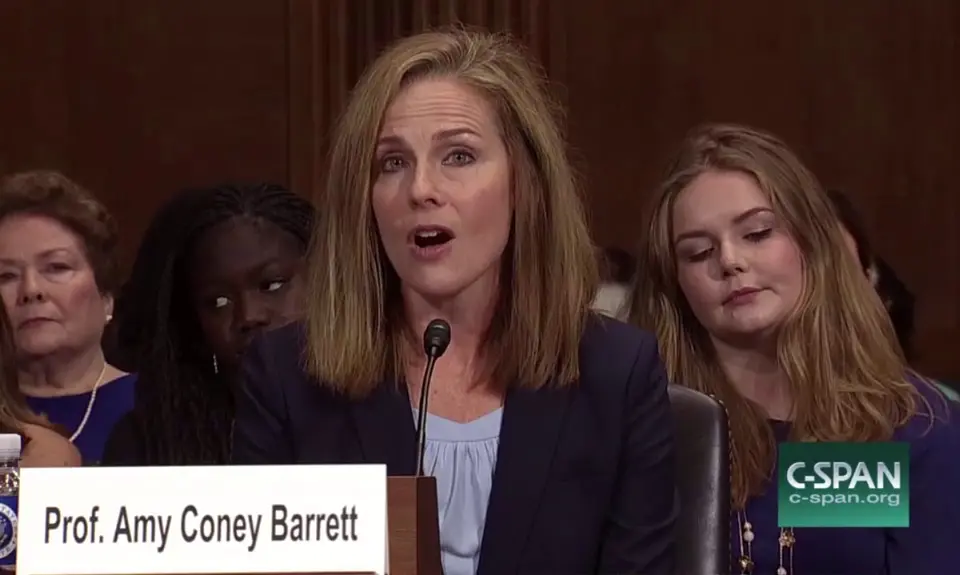This post was originally published on HuffPost.
The Senate is getting ready to move on another set of awful judicial nominees chosen to advance the far-right’s goal of gaining ideological dominance over the federal judiciary as a way to reverse many of the social justice gains of the past century. But to distract public attention from this disastrous objective, count on Republicans and their right-wing allies to smear Democrats who raise objections to the nominees.
A prime example is Amy Coney Barrett, who has been nominated to serve on the Seventh Circuit Court of Appeals. When Democratic senators on the Judiciary Committee questioned Barrett over an article she had written about how judges should handle conflicts between their religious beliefs and the law, Republicans and right-wing media went ballistic with unfair charges of religious bigotry. They even brought back a smear they had used almost 15 years ago against critics of judicial nominee William Pryor, suggesting that Democrats were declaring that “Catholics need not apply.” (The absurdity of this charge is amplified by the fact that among the senators targeted are Catholics like Sen. Richard Durbin.)
Barrett had written explicitly about potential conflicts faced by Catholic judges when Church teachings about topics like the death penalty and abortion might conflict with their responsibility to uphold the law. She noted that church prohibitions on abortion and euthanasia are “absolute,” while “those against war and capital punishment are not.” In her writing, she had asserted that judges who are “heedful of ecclesiastical pronouncements” might not be able to dispense impartial justice, and therefore might need to recuse themselves. Yet under questioning she said that she could not envision any case coming before her that would require her recusal.
That is not just an academic exercise, especially at a time when dominionists in the Religious Right are urging government officials to shape policy in alignment with their biblical worldview.
We can see what that looks like. It looks like county clerk Kim Davis, who refused to abide by the Supreme Court’s marriage equality ruling, and blocked her staff from processing marriage applications for any couples. It looks like E. Scott Lloyd, Trump’s director of the Office of Refugee Resettlement and an anti-abortion activist, who aggressively blocked a pregnant teenager living in an ORR shelter from getting an abortion she sought. It looks like Roy Moore, who was twice ousted from his job as Chief Justice in Alabama for defying federal court orders on church-state separation and marriage equality, and yet is being supported in his Senate bid by Republicans who proclaim themselves defenders of the rule of law.
In the past, when elected or appointed officials have abused the power of their office to impose their religious beliefs on others in ways that harm them, we have counted on the federal courts to uphold constitutional principles. That’s why it is so potentially damaging to have the Senate approve judicial nominees who see the courts, as right-wing activists do, as an instrument for imposing their religious and political views about morality and the Constitution. And why it is so ridiculous for Republicans to complain about senators questioning a nominee about her own published views on the subject.
Of course, conservative Christians have the same constitutional right as people of other faiths and people who are religiously unaffiliated to bring their values into public debate on controversial issues. No American’s rights or opportunities should be restricted based on their religious beliefs. It would be wrong, for example, to reject a judicial nominee because her church teaches that homosexuality is a sin. But it is absolutely appropriate to ask whether such a nominee for a lifetime position on the federal courts would commit, regardless of her church’s teaching, to upholding the constitutional and legal equality of LGBTQ Americans.
Along those lines, Sen. Al Franken questioned Barrett about her relationship with the Alliance Defending Freedom, a group that actively opposes legal equality for LGBTQ Americans and supports laws that criminalize homosexuality. Barrett argued with the ADF’s designation by the as an anti-gay hate group. But her involvement with a group opposing equal protection of the law for some Americans is certainly a valid line of questioning for someone seeking a lifetime position on the federal bench!
